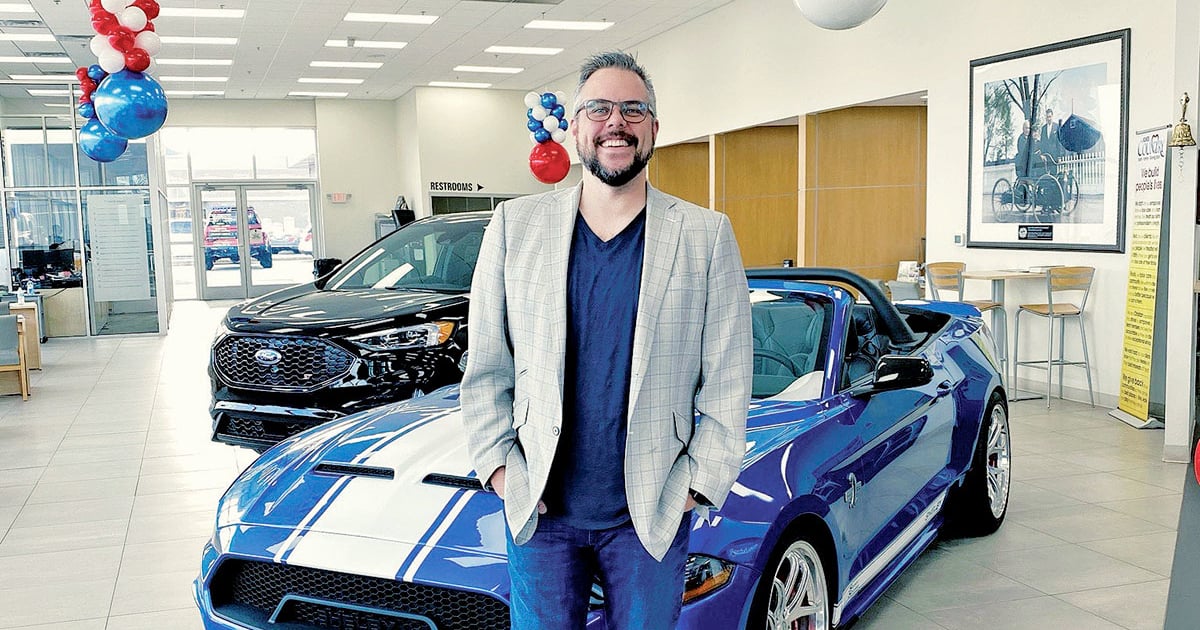
Here’s one way to sell lots of used cars: Source them from as many places as possible.
Kunes Auto Group, founded in 1996 by CEO Gregg Kunes, follows that strategy. Kunes Auto Group in Delavan, Wis., owns 28 franchised dealerships throughout Wisconsin, Illinois and Iowa.
“We’ll use [wholesale vehicle auction operation] Manheim, SmartAuction, ACV Auctions … we use CarOffer,” Kunes said. CarOffer is CarGurus’ digital wholesale business.
“In this day and age where the U.S. vehicle market has become so competitive, we had to make sure that we’re taking advantage of every single channel we possibly could,” he said.
That expanded acquisition strategy, a 90-day write-down policy and a focus on vehicle variety are among key moves that have helped Kunes Auto maintain its strong used-vehicle sales performance.
Kunes Auto sold 17,875 used vehicles in 2022, dwarfing the 9,233 new vehicles it sold last year, as it achieved a used-to-new vehicle sales ratio of 1.94, well ahead of the typical auto retailer goal to have a 1:1 ratio.
That’s according to Automotive News‘ list of the top 100 dealership groups based in the U.S., ranked by used-vehicle sales. Kunes had the fourth-highest used-to-new ratio on the list, behind Garber Management Group, Cooper Auto Group and Russ Darrow Group. Kunes ranked third in the previous year’s ranking, with a ratio of 2.02.
The average dealership group on the list sold 1.09 used vehicles for every new vehicle, down from 1.52 in 2021. But the ratio that year tilted higher because of sales of used-car giants CarMax Inc., Carvana Co., Vroom Inc. and Shift Technologies Inc., which aren’t part of the most recent list.
A new, separate list of leading used- vehicle-only retailers can be found here.
At all Kunes dealerships, salespeople sell both new and used vehicles. Used vehicles typically turn in 34 days, Kunes said. During that period, nine days are used to recondition them, though Kunes said they try to reduce that to one week.
Kunes Auto highlighted additional strategies that help it with used-car sales.
On the first of every month, Kunes Auto cuts inventory cost by an undisclosed set amount on whatever vehicles are unsold for 90 days or longer. This cost directly hits the used-car department’s selling gross. Kunes explained that the practice encourages sales managers to ensure they acquire cars correctly and that they’re trying to move the oldest inventory before they take that penalty.
Kunes Auto stores are broken into regions, and stores are allowed to purchase vehicles from one another, enabling some of the group’s more rural dealerships to access inventory from larger stores.
The stores achieve savings by reselling used vehicles within the dealership group and avoid sending cars to an auction to sell, Kunes said.
“We’ll try to conserve those auction fees and do it all in-house,” he said.
Inventory management software also comes into play, something that Kunes and many dealers use to help monitor the U.S. market, create pricing descriptions and upload photos.
Having a website provider also helps, Kunes said, particularly one that is savvy about building a dealership website from the ground up that can be used effectively via phones and desktop computers. A favorite is software provider Motive, he said, particularly with its focus on search engine optimization and search engine marketing.
Software tools have become increasingly commonplace among dealers in the post-pandemic marketplace.
Kunes Auto also tries to find “diamonds” and niche vehicles that others don’t want.
“Whether it’s a model that maybe has lost its luster or isn’t quite as popular, oftentimes we’ll be able to buy a lot of those at a good price and be able to market those effectively,” Kunes said. “We’re 28 dealerships. Somebody’s going to be able to sell that vehicle, whether it’s a Range Rover that we don’t normally stock or a $5,000 car.”
When the pandemic hit, Kunes Auto heard from some of its manufacturer representatives about supply chain constraints, so it become more aggressive in securing both new and used cars, even purchasing new vehicles from other dealers.
And because Kunes Auto operated in more rural markets, it needed a used-car selection to make it a destination, he said.
New-car shoppers could just as easily buy a used car, after all. Keeping new-car stocks high also allowed it to continue to take trade-ins and retail as many used vehicles, Kunes said.
Kunes Auto expanded its used-car inventory in 2021 and part of 2022. As the supply chain strain began to ease, they began to roll that back again through early 2023 in an effort to stay ahead of the curve.
Most of all, the basics still matter, Kunes said.
“It’s still about acquiring vehicles at the right cost, marketing them correctly, providing good value to our customers and a great experience,” Kunes said.
“If we can do that correctly, we will typically be successful in our used-car operations.”
Kunes Auto ranks No. 96 on Automotive News‘ most recent list of the top 150 dealership groups based in the U.S. and No. 42 on Automotive News‘ list of the top 100 dealership groups ranked by used-vehicle sales. The group also owns RV dealerships.